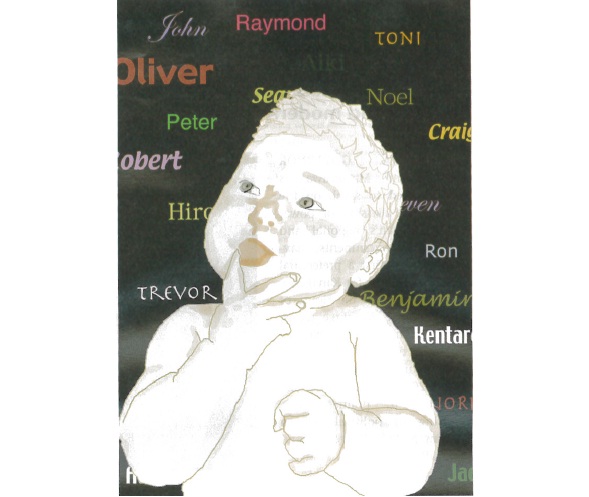Kit Nagamura finds out if a rose is still a rose by any other name
WHAT’S IN A NAME? For starters: family heritage, first impressions, historical associations and social trends. Add to this a big bag of subconscious connotations — the loathsome name of your high school nemesis, for example, or the memorable moniker of your first crush — and it becomes clear why settling on a baby’s name can be such a challenge. But the goal of finding a bilingual baby name that works well in two languages as disparate as Japanese and English? Now we’re talking drama!
If your spouse is Japanese, he or she will let you know (sooner or later) that names with “ba-bi-bu-be-bo” or “pa-pi-pu-pe-po” or “ga-gi-gu-ge-go” sounds in them are not generally the best choices. Too bad, because that’s about all Baby says in the first few months. Anyway, if you choose to follow this advice, it knocks out Brian (Bu-rai-en), Paul (Po-ru), Brittney (Bu-ri-tsu-ni), and Gabrielle (Ga-bu-ri-e-ru), to note a few. Multi-syllabic names, which would require an excessively long string of kanji to convey the sounds, are also problematic. So, say goodbye to Alexandra (five kanji), Sebastian (five kanji), Nathaniel (five kanji), Christina (five kanji), Elizabeth (five kanji), and Thrackmorton (you care?). Shorten the name, and it might work in Japanese: Al, Chris, Liza, etc. Not so for poor Nate or Thrack, though. In fact, names that begin with the “th” sound or end in a “t,” “k,” or almost any consonant except “n,” are going to get an addendum in Japanese. You won’t hear just “Jack,” but something more like “Jack-ku.”
There is, of course, the well-known “r” and “l” difficulty to consider, but many recent names celebrate the ambiguity between the sounds: there are a lot of “Linda/Rindas” and “Liam/Riams.” Fine most of the time, except it renders “Lacey” racy, and leaves “Laine” a little wet. Widespread exposure can help pronunciation, but don’t be surprised if “Bill” still pours out as “Biru.” One further note: it makes life much easier in the long run if your child’s name is the same in both foreign and Japanese passports. This means that you may have a struggle with the “L” letter when applying for a Japanese passport. Some officials will claim that “L” is not Japanese. Well, strictly speaking neither is “R,” and the information is typed into documents with your standard QWERTY keyboard. Still, old hands suggest that you get your passport made in English first, to help prove that “Blaise” is not “Braise.”
Another tactic savvy ex-pats recommend is to choose from a list of names already familiar to Japanese, with sounds relatively easy to render in either language. Some nifty examples include: Ben, Emi (Amy), Emma, Mari (Mary), Arisa (Alisa or Alyssa), Ken, Zen, Emiri (Emily), An (Ann or Anne), Anna, Taira (Tyler), Jenna, Juria (Julia), Daiana (Diana), Rin (Lynne), Reo (Leo), Kei (Kay), Hana (Hannah), Miki (Mickey), Mei (May), Naomi, Rei (Ray), Shina (Sheena), Sari (Sally), Riona (Leona).
Occasionally a popular name in Japanese will have less than desirable results in English. “Shun,” for example, is on the hit list this year, but consider how it’s written. Better to shun it, or change the spelling in English. “Dai” sounds great (literally) in Japanese, but it’s a grim command in English. “Kane” is another golden oldie in Japanese, but will undoubtedly be mispronounced; avoid Kane if you are Abel.
Once you have a name that satisfies you in sound and Roman letters, you’re still only half-done. Unless your partner prefers the relative simplicity of katakana or hiragana, or already has a must-use list of kanji, you’re going to be on the prowl for cool characters to fit to the name. Natural images (the ocean, forest, flowers), mental or physical attributes (strength, beauty, wisdom, and the like), or references to historical figures, family members, or popular idols are wells from which kanji tend to spring. Unlike many westerners, though, it’s unlikely your Japanese partner will saddle your offspring with an exact replication of Uncle Ryonosuke’s name if Uncle is still alive. Japanese consider it bad luck to reissue a living relative’s name using the same characters, but borrowing a kanji or two from Ryonosuke is okay. Bennosuke? Why not? With nearly 3,000 legally acceptable characters to choose from, you need some jumping-off point. Many couples these days actually start with the kanji, choosing a pleasing shape or meaning, and later dealing with the pronunciation. Some even concoct an unofficial pronunciation for the kanji; it’s legal, but it galls kanji purists, and may require a lifetime of explanation over name cards. People survive such things.
There’s a final hurdle you might encounter in the world of Japanese naming conventions. If you know the word “onomancy,” you’ve probably been here and done this naming thing. Otherwise, how would you guess that one’s life fortune might be divined in the number of strokes used to write a name? Not only that, but the number of strokes in the kanji you choose for junior should match up auspiciously with the number of strokes in the family name (yup, foreign names too). Finding out if this is important to anyone in your Japanese clan is a good thing to do horn the start. You do not need junior’s third cousin, twice removed, shaking his head every time junior meets misfortune, blaming it on the kanji you chose for his name. Get the fortuneteller’s parameters before anything else; doing the process in reverse can take more than the nine months you thought you had. Happy hunting!









